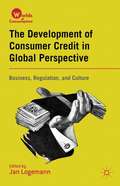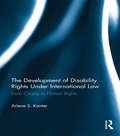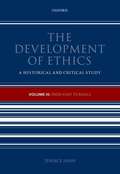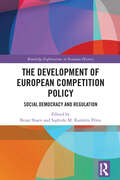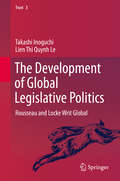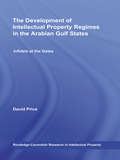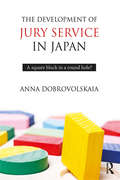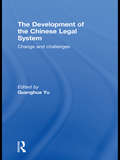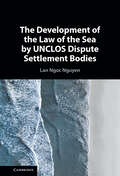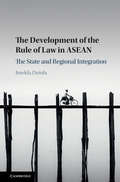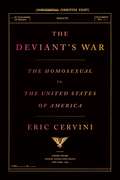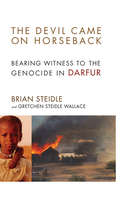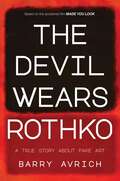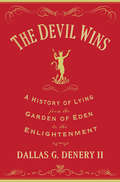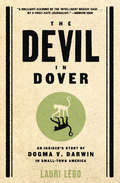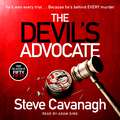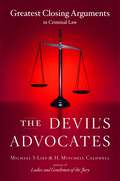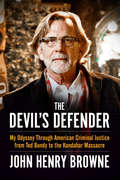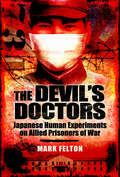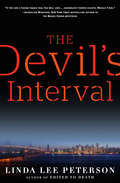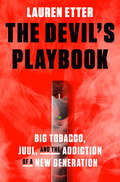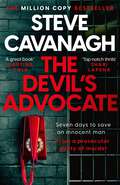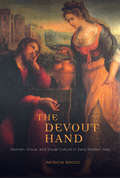- Table View
- List View
The Development of Consumer Credit in Global Perspective
by Jan LogemannThis volume brings together historians, economists, political scientists, and anthropologists to present a global perspective on the new forms of lending and borrowing that have become a key feature of twentieth-century mass consumer societies, emphasizing comparative and transnational historical perspectives.
The Development of Disability Rights Under International Law: From Charity to Human Rights
by Arlene S. KanterThe adoption of the Convention on the Rights of People with Disabilities (CPRD) by the United Nations in 2006 is the first comprehensive and binding treaty on the rights of people with disabilities. It establishes the right of people with disabilities to equality, dignity, autonomy, full participation, as well as the right to live in the community, and the right to supported decision-making and inclusive education. Prior to the CRPD, international law had provided only limited protections to people with disabilities. This book analyses the development of disability rights as an international human rights movement. Focusing on the United States and countries in Asia, Africa, the Middle East the book examines the status of people with disabilities under international law prior to the adoption of the CPRD, and follows the development of human rights protections through the convention’s drafting process. Arlene Kanter argues that by including both new applications and entirely new approaches to human rights treaty enforcement, the CRPD is significant not only to people with disabilities but also to the general development of international human rights, by offering new human rights protections for all people. Taking a comparative perspective, the book explores how the success of the CRPD in achieving protections depends on the extent to which individual countries enforce domestic laws and policies, and the changing public attitudes towards people with disabilities. This book will be of excellent use and interest to researchers and students of human rights law, discrimination, and disability studies.
The Development of Ethics A Historical and Critical Study Volume III: From Kant to Rawls
by Terence IrwinThis book is a selective historical and critical study of moral philosophy in the Socratic tradition, with special attention to Aristotelian naturalism. It discusses the main topics of moral philosophy as they have developed historically, including: the human good, human nature, justice, friendship, and morality; the methods of moral inquiry; the virtues and their connexions; will, freedom, and responsibility; reason and emotion; relativism, subjectivism, andrealism; the theological aspect of morality. The first volume discusses ancient and mediaeval moral philosophy.
The Development of European Competition Policy: Social Democracy and Regulation (Routledge Explorations in Economic History)
by Sigfrido M. Ramírez Pérez Brian ShaevThis book considers a central issue of our time: the relationship between the macroeconomic objectives of political parties in democratic countries and the legal framework of market economies. The impressive panel of contributors examines social-democratic policies on cartels, market concentration and competition in different European countries, spanning a hundred-year period (specifically the interwar period, the initial postwar period, the 1960s and 1970s, the 1980s and 1990s, and the 2000s).This thought-provoking volume challenges the dominant belief that the EU’s economic system and competition policy were mainly influenced by neoliberal economic thinking, instead showing that Keynesian and social-democratic positions played a major role in the emergence of this system.It will be valuable reading for advanced students, researchers and policymakers interested in modern economic history, industrial organization, political economy, European legal history and political science.
The Development of Global Legislative Politics: Rousseau and Locke Writ Global (Trust #3)
by Takashi Inoguchi Lien Thi LeThis book is the first systematic scientific study of global quasi-legislation. Taking public opinion and multilateral agreements as the international equivalent to national election and passing laws on the national scale, and extending nation-state concepts to a global society, it analyzes citizens' preferences and the state's willingness to enter into 120 multilateral treaties. After identifying the links as a first step toward conceptualizing quasi-legislative global politics, the book examines how each of the 193 states manifests quasi-legislative behavior by factor-analyzing six instrumental variables such as treaty participation index and six policy domains of multilateral treaties, including peace and trade. It then discusses global change between 1989 and 2008, and conceptually and empirically examines the three theories of global politics that originated during that period: the theory of power transition, theory of civilizational clash and theory of global legislative politics. Lastly, it proposes a theory of global legislative politics. Shedding fresh light on the transformative nature of multilateral treaties, this book attracts researchers and students in political philosophy, international law and international relations as well as practitioners and journalists.Inoguchi and Le have developed a genuinely original perspective on world politics, one that opens up a new research agenda for thinking about state and global actors simultaneously.-- Anne-Marie Slaughter, Bert G. Kerstetter '66 University Professor Emerita of Politics and International Affairs, Princeton UniversityThis is one of those books that warrant a global readership given its emphasis on the implied trust that we invest in public institutions as viewed from an interdisciplinary perspective. -- Richard J. Estes, Professor of Social Policy & Practice, University of Pennsylvania, Philadelphia, PennsylvaniaThis book is innovative and distinctive in carving out a new way to look at “global legislative politics.” I do not know of anything that compares in this interesting and novel niche of international relations analysis.-- William R. Thompson, Distinguished Professor and Rogers Chair of Political Science Emeritus, Indiana University
The Development of Institutions of Human Rights
by Lilian A. Barria Steven D. RoperDuring the transition to democracy, states have used various mechanisms to address previous human rights abuses including trials, truth and reconciliation commissions and internationalized tribunals. This volume analyzes the transitional justice choices made by four countries: Argentina, Bosnia-Herzegovina (BiH), Sierra Leone and East Timor.
The Development of Intellectual Property Regimes in the Arabian Gulf States: Infidels at the Gates (Routledge Research in Intellectual Property)
by David Price Alhanoof AlDebasiThis book examines the development of national legislative regimes for the protection of intellectual property rights in the Arabian Gulf states: Bahrain, Kuwait, Oman, Qatar, Saudi Arabia, the United Arab Emirates, and Yemen. David Price analyses IP rights in these states in the context of WTO membership, and consequent compliance with the requirements of the WTO’s TRIPS Agreement. The challenges of domestic enforcement of the states’ IP laws receive critical attention. A particular focus of the book is on foreign forces which have shaped or influenced the character of the states’ IP protection regimes. It includes commentary on the contribution of foreign states, the WTO and WIPO in the pre-TRIPS and TRIPS compliance stages, and the US bilateral trade strategy for pursuing IP protection standards that exceed those enshrined in TRIPS, and the impact of these forces upon the states’ enforcement performance. The role of the Office of the United States Trade Representative (USTR) and the Special 301 provisions as a powerful tool in the US’ bilateral strategy receives particular attention. The intellectual property laws of these states have been developed virtually in the span of a single generation, and the process of change is continuing. As such, this book will interest practitioners both in and outside of the region, and those with an interest in intellectual property law, comparative law, Middle East legal systems and affairs, and international trade.
The Development of Iran’s Upstream Oil and Gas Industry: The Potential Role of New Concession Contracts (Routledge Research in Energy Law and Regulation)
by Mahmoud Fard KardelThis book critically examines different forms of petroleum contracts, the historical perspective of the oil and gas industry and the political economy of the petroleum development in Iran. In doing this, the author provides analysis of the concept of concession in oil and gas development. This is discussed through the main forms of concession contracts; namely, the classic concession contract (CCC) and the new concession contract (NCC). The book ties together much of the existing work on the history of oil and gas regulation in Iran and builds on that foundation to propose a coherent and balanced approach within the framework of the NCC. To consider the role of the NCC in developing national upstream oil and gas industry, comparative examples are drawn from countries currently using, or having previously used, NCC oil and gas contracts. The selected developed and developing countries are Brazil, Thailand, the United Kingdom, Australia and Norway. The analysis considers the extent to which the NCC has served to advance the objectives and national interests of the national governments in this industry. The book involves a comparative exploration of the utilisation of NCCs in other jurisdictions and synthesises a framework through which Iran may develop its underutilised oil and gas resources. Of interest to academics, students and practitioners throughout the world, this book focuses on the relevant aspects of Iran’s Constitution and natural resource laws and makes recommendations for law reform to Iran’s legal frameworks.
The Development of Jury Service in Japan: A square block in a round hole?
by Anna DobrovolskaiaThis book presents a comprehensive account of past and present efforts to introduce the jury system in Japan. Four legal reforms are documented and assessed: the implementation of the bureaucratic and all-judge special jury systems in the 1870s, the introduction of the all-layperson jury in the late 1920s, the transplantation of the Anglo-American-style jury system to Okinawa under the U.S. Occupation, and the implementation of the mixed-court lay judge (saiban’in) system in 2009. While being primarily interested in the related case studies, the book also discusses the instances when the idea of introducing trial by jury was rejected at different times in Japan’s history. Why does legal reform happen? What are the determinants of success and failure of a reform effort? What are the prospects of the saiban’in system to function effectively in Japan? This book offers important insights on the questions that lie at the core of the law and society debate and are highly relevant for understanding contemporary Japan and its recent and distant past.
The Development of the Chinese Legal System: Change and Challenges
by Guanghua YuIn recent years the Chinese legal system has undergone many reforms and this book brings the literature up to date, offering a contemporary account of the law and administration in China. This book is the result of collective efforts in analysing the political, economic and social factors which affect the development of Chinese law. The volume contains contributions from a number of experts and scholars of Chinese law who examine some of the most important areas of Chinese law. The book covers constitutional law, criminal law, property law, mortgage law, intellectual property law, corporate law, securities regulation, banking regulation, civil procedural law, arbitration law, environmental law, and the regulation of telecommunications services. Whilst the book addresses a number of diverse legal areas all the contributions look to explain the factors which led to the development of the law and the consequences of such developments, as well as the progress made by developing legal institutions and the possible obstacles to future development.
The Development of the Law of the Sea by UNCLOS Dispute Settlement Bodies
by Lan Ngoc NguyenThis is the first study to provide both a systematic assessment of the ways by which the dispute settlement bodies of the United Convention on the Law of the Sea (UNCLOS) contribute to the development of the law of the sea and an exposition of the factors that explain such contribution. The book analyses UNCLOS dispute settlement bodies' decisions and the legal reasoning in key areas of the law of the sea. It further examines the factors that impact the decision-making process of UNCLOS tribunals to explain the parameters within which UNCLOS tribunals operate and how this impacts their ability and willingness to develop the law. The book provides a unique reference point for lecturers, researchers and students of international law, particularly law of the sea, as well as practitioners and government advisors who wish to gain comprehensive insights into the functioning and the role of the UNCLOS dispute settlement system.
The Development of the Rule of Law in ASEAN: The State and Regional Integration
by Imelda DeinlaAn interdisciplinary work that comparatively studies rule of law practices and the relationship between the rule of law and regional integration, a topic largely explored in European integration. By looking at the function of the rule of law in ASEAN rather than what it 'means' measured on normative conception, the book situates the rule of law in broader institutional and political processes in the member states and in regional relations to show the motivations of member states in adopting a peculiar type of regional architecture. It asks whether forging the rule of law in the region can help build it internally for member states. The book revisits discourses on the 'spill-over' of economic integration, the impact of globalization in reshaping the state and generating new tools of the rule of law. It makes a comprehensive comparison - the European Union, Africa Union and MERCOSUR - showing the uneven pathways to rule of law in various contexts.
The Deviant's War: The Homosexual Vs. The United States of America
by Eric CerviniFrom a young Harvard- and Cambridge-trained historian, the secret history of the fight for gay rights that began a generation before Stonewall. <p><p> In 1957, Frank Kameny, a rising astronomer working for the U.S. Defense Department in Hawaii, received a summons to report immediately to Washington, D.C. The Pentagon had reason to believe he was a homosexual, and after a series of humiliating interviews, Kameny, like countless gay men and women before him, was promptly dismissed from his government job. Unlike many others, though, Kameny fought back. <p> Based on firsthand accounts, recently declassified FBI records, and forty thousand personal documents, Eric Cervini's The Deviant's War unfolds over the course of the 1960s, as the Mattachine Society of Washington, the group Kameny founded, became the first organization to protest the systematic persecution of gay federal employees. It traces the forgotten ties that bound gay rights to the Black Freedom Movement, the New Left, lesbian activism, and trans resistance. Above all, it is a story of America (and Washington) at a cultural and sexual crossroads; of shocking, byzantine public battles with Congress; of FBI informants; murder; betrayal; sex; love; and ultimately victory.
The Devil Came on Horseback: Bearing Witness to the Genocide in Darfur
by Brian Steidle Gretchen Steidle WallaceFormer United States Marine Brian Steidle served for six months in Darfur as an unarmed military observer for the African Union. There he witnessed first-hand the ongoing genocide, and documented every day of his experience using email, audio journals, notebook after notebook and nearly 1,000 photographs. Gretchen Steidle Wallace, his sister, who wrote this book with Brian, corresponded with him throughout his time in Darfur. Fired upon, taken hostage, a witness to villages destroyed and people killed, frustrated by his mission's limitations and the international community's reluctance to intervene, Steidle resigned and has since become an advocate for the world to step in and stop this genocide. The Devil Came on Horseback depicts the tragic impact of an Arab government bent on destroying its black African citizens, the maddening complexity of international inaction in response to blatant genocide, and the awkward, yet heroic transformation of a formerMarine turned humanitarian. It is a gripping and moving memoir that bears witness to atrocities we have too long averted our eyes from, and reveals that the actions of just one committed person have the power to change the world.
The Devil Wears Rothko
by Barry AvrichThe Devil Wears Rothko charts the explosive demise of Knoedler Gallery, one of New York&’s oldest and most prestigious art galleries, with detailed and salacious insight into the art fraud scandal of the century.The Devil Wears Rothko charts the explosive demise of Knoedler Gallery, one of New York&’s oldest and most prestigious art galleries, with detailed and salacious insight into the art fraud scandal of the century. From the moment an eccentric woman walked into the Knoedler Gallery with a Mark Rothko painting, everyone was fooled. For the next ten years, she ran an $80 million forgery ring, selling or consigning forty expertly crafted counterfeits claimed to be the works of Robert Motherwell, Jackson Pollock, Mark Rothko, and others. Director of the acclaimed documentary Made You Look (2020) streamed on Netflix, Barry Avrich reveals new information, evidence, and inside stories about how a quixotic art dealer, master forger, and two cunning con artists managed to fool billionaire art collectors, journalists, and esteemed art appraisers. By the time the house of cards finally fell, the Knoedler Gallery and a dozen collectors had been tricked into buying over $80 million in fake art. Could it happen again? The Devil Wears Rothko exposes the art world as a fragile system of relationships vulnerable to manipulation by the most captivating artists of our time: con artists.
The Devil Wins
by Dallas G. Denery IIIs it ever acceptable to lie? This question plays a surprisingly important role in the story of Europe's transition from medieval to modern society. According to many historians, Europe became modern when Europeans began to lie--that is, when they began to argue that it is sometimes acceptable to lie. This popular account offers a clear trajectory of historical progression from a medieval world of faith, in which every lie is sinful, to a more worldly early modern society in which lying becomes a permissible strategy for self-defense and self-advancement. Unfortunately, this story is wrong.For medieval and early modern Christians, the problem of the lie was the problem of human existence itself. To ask "Is it ever acceptable to lie?" was to ask how we, as sinners, should live in a fallen world. As it turns out, the answer to that question depended on who did the asking. The Devil Wins uncovers the complicated history of lying from the early days of the Catholic Church to the Enlightenment, revealing the diversity of attitudes about lying by considering the question from the perspectives of five representative voices--the Devil, God, theologians, courtiers, and women. Examining works by Augustine, Bonaventure, Martin Luther, Madeleine de Scudéry, Jean-Jacques Rousseau, and a host of others, Dallas G. Denery II shows how the lie, long thought to be the source of worldly corruption, eventually became the very basis of social cohesion and peace.
The Devil in Dover: An Insider's Story of Dogma v. Darwin in Small-Town America
by Lauri Lebo&“A brilliant account&” of the controversial 2005 legal battle between evolution and creationism in public education &“by a first-rate journalist&” (Howard Zinn). In 2004, the School Board of Dover, Pennsylvania, decided to require its ninth-grade biology students to learn intelligent design—a pseudoscientific theory positing evidence of an intelligent creator. In a case that recalled the infamous 1925 Scopes &“monkey&” trial, eleven parents sued the school board. When the case wound up in federal court before a President George W. Bush–appointed judge, local journalist Lauri Lebo had a front-row seat. Destined to become required reading for a generation of journalists, scientists, and science teachers, as well as for anyone concerned about the separation of church and state, The Devil in Dover is Lebo&’s acclaimed account of religious intolerance, First Amendment violations, and an assault on American science education. Lebo skillfully probes the background of the case, introducing the plaintiffs, the defendants, the lawyers, and a parade of witnesses, along with Judge John E. Jones III, who would eventually condemn the school board&’s decision as one of &“breathtaking inanity.&” With the antievolution battle having moved to the state level—and the recent passage of state legislation that protects the right of schools to teach alternatives to evolution—Lebo&’s work is more necessary than ever. &“Lebo courageously exhibits the highest standards in intellectual honesty and journalistic ethos.&” —Daily Kos &“An unapologetic indictment of intelligent design, fundamentalist Christianity, and American journalism&’s insistence on objectivity in the face of clear untruths.&” —Columbia Journalism Review
The Devil's Advocate: The Sunday Times Bestseller (Eddie Flynn Series)
by Steve Cavanagh'The Devil's Advocate makes your palms sweat and your blood run cold; the terrific trial scenes out-Grisham John Grisham.' The Times'This guy is the real deal. Trust me.' LEE CHILD'Top notch thrills and courtroom drama' SHARI LAPENA'A terrific writer. He has talent to burn.' DON WINSLOWHE'S WON EVERY TRIAL. BECAUSE HE'S BEHIND EVERY MURDER.Ambitious District Attorney Randal Korn lives to watch prisoners executed.Even if they are not guilty. An innocent man, Andy Dubois, faces the death penalty for the murder of young girl. Korn has already fixed things to make sure he wins a fast conviction. The one thing Korn didn't count on was Eddie Flynn. Slick, street smart and cunning, the former con artist turned New York lawyer has only seven days to save an innocent man against a corrupt system and find the real killer. In a week the Judge will read the verdict, but will Eddie be alive to hear it?'Addictive, unpredictable and timely' WILL DEAN'Gripping, twisty and smart' JANE FALLON'THE beach read of the summer of 2021' ADRIAN MCKINTY'Like a binge-worthy boxset in book form' PHILIPPA PERRY'This is Steve Cavanagh's best yet' JO SPAIN
The Devil's Advocates: Greatest Closing Arguments in Criminal Law
by Michael S Lief H. Mitchell CaldwellFrom the authors of the acclaimed Ladies and Gentlemen of the Jury, and featuring some of the most important cases in criminal law, The Devil's Advocates is the final volume of a must-have trilogy of the best closing arguments in American legal history. Criminal law is considered by many to be the most exciting of the legal specialties, and here the authors turn to the type of dramatic crimes and trials that have so captivated the public -- becoming fodder for countless television shows and legal thrillers. But the eight cases in this collection have also set historical precedents and illuminated underlying principles of the American criminal justice system. Future president John Adams makes clear that even the most despised and vilified criminal is entitled to a legal defense in the argument he delivers on behalf of the British soldiers who shot and killed five Americans during the Boston Massacre. The always-controversial temporary-insanity defense makes its debut within sight of the White House when, in front of horrified onlookers, a prominent congressman guns down the district attorney over an extramarital affair. Clarence Darrow provides a ringing defense of a black family charged with using deadly force to defend themselves from a violent mob -- an argument that refines the concept of self-defense and its applicability to all races. The treason trial of Aaron Burr, accused of plotting to "steal" the western territories of the United States and form a new country with himself as its head, offers a fascinating glimpse into a rare type of prosecution, as well as a look at one of the most interesting traitors in the nation's history. Perhaps the best-known case in the book is that of Ernesto Miranda, the accused rapist whose trial led to the Supreme Court decision requiring police to advise suspects of their rights to remain silent and to have an attorney present -- their Miranda rights. Each of the eight cases presented here is given legal and cultural context, including a brief historical introduction, a biographical sketch of the attorneys involved, highlights of trial testimony, analysis of the closing arguments, and a summary of the trial's impact on its participants and our country. In clear, jargon-free prose, Michael S Lief and H. Mitchell Caldwell make these pivotal cases come to vibrant life for every reader.
The Devil's Defender: My Odyssey Through American Criminal Justice from Ted Bundy to the Kandahar Massacre
by John BrowneIn the tradition of bestselling legal memoirs from Johnnie Cochran, F. Lee Bailey, Gerry Spence, and Alan Dershowitz, John Henry Browne's memoir, The Devil's Defender, recounts his tortuous education in what it means to be an advocate--and a human being. For the last four decades, Browne has defended the indefensible. From Facebook folk hero "the Barefoot Bandit" Colton Moore, to Benjamin Ng of the Wah Mee massacre, to Kandahar massacre culprit Sgt. Robert Bales, Browne's unceasing advocacy and the daring to take on some of the most unwinnable cases--and nearly win them all--has led 48 Hours' Peter Van Sant to call him "the most famous lawyer in America." But although the Browne that America has come to know cuts a dashing and confident figure, he has forever been haunted by his job as counsel to Ted Bundy, the most famous serial killer in American history. A drug- and alcohol-addicted (yet wildly successful) defense attorney who could never let go of the case that started it all, Browne here asks of himself the question others have asked him all along: does defending evil make you evil, too?
The Devil's Doctors: Japanese Human Experiments on Allied Prisoners of War
by Mark FeltonThe author of Guarding Hitler delivers &“a study revealing the Japanese use of Allied POWs in medical experiments during WWII.&”—The Guardian The brutal Japanese treatment of Allied POWs in WW2 has been well documented. The experiences of British, Australian and American POWs on the Burma Railway, in the mines of Formosa and in camps across the Far East, were bad enough. But the mistreatment of those used as guinea pigs in medical experiments was in a different league. The author reveals distressing evidence of Unit 731 experiments involving US prisoners and the use of British as control groups in Northern China, Hainau Island, New Guinea and in Japan. These resulted in loss of life and extreme suffering. Perhaps equally shocking is the documentary evidence of British Government use of the results of these experiments at Porton Down in the Cold War era in concert with the US who had captured Unit 731 scientists and protected them from war crime prosecution in return for their cooperation. The author&’s in-depth research reveals that, not surprisingly, archives have been combed of much incriminating material but enough remains to paint a thoroughly disturbing story. &“The narrative does not seek sensation or attempt to draw irrefutable conclusions where it is clearly impossible to do so, instead it simply provides a balanced assessment of what is known and what seems probable.&”—Pegasus Archive
The Devil's Interval (The Maggie Fiori Mysteries #2)
by Linda Lee PetersonMaggie Fiori uses her powers as a journalist to dig into the world of San Francisco's elite after a limo driver is convicted of murdering a socialite. Between managing her sons' soccer practices, saving her damaged marriage, and handling her maddening staff, Maggie fights to prove that the "Limousine Lothario" was guilty of no more than loving his mother.
The Devil's Playbook: Big Tobacco, Juul, and the Addiction of a New Generation
by Lauren EtterBig Tobacco meets Silicon Valley in this corporate exposé of what happened when two of the most notorious industries collided—and the vaping epidemic was born.&“The best business book I&’ve read since Bad Blood.&”—Jonathan Eig, New York Times bestselling author of Ali: A Life Howard Willard lusted after Juul. As the CEO of tobacco giant Philip Morris&’s parent company and a veteran of the industry&’s long fight to avoid being regulated out of existence, he grew obsessed with a prize he believed could save his company—the e-cigarette, a product with all the addictive upside of the original without the same apparent health risks and bad press. Meanwhile, in Silicon Valley, Adam Bowen and James Monsees began working on a device that was meant to save lives and destroy Big Tobacco, but they ended up baking the industry&’s DNA into their invention&’s science and marketing. Ultimately, Juul&’s e-cigarette was so effective and so market-dominating that it put the company on a collision course with Philip Morris and sparked one of the most explosive public health crises in recent memory. In a deeply reported account, award-winning journalist Lauren Etter tells a riveting story of greed and deception in one of the biggest botched deals in business history. Etter shows how Philip Morris&’s struggle to innovate left Willard desperate to acquire Juul, even as his own team sounded alarms about the startup&’s reliance on underage customers. And she shows how Juul&’s executives negotiated a lavish deal that let them pocket the lion&’s share of Philip Morris&’s $12.8 billion investment while government regulators and furious parents mounted a campaign to hold the company&’s feet to the fire.The Devil&’s Playbook is the inside story of how Juul&’s embodiment of Silicon Valley&’s &“move fast and break things&” ethos wrought havoc on American health, and how a beleaguered tobacco company was seduced by the promise of a new generation of addicted customers. With both companies&’ eyes on the financial prize, neither anticipated the sudden outbreak of vaping-linked deaths that would terrorize a nation, crater Juul&’s value, end Willard&’s career, and show the costs in human life of the rush to riches—while Juul&’s founders, board members, and employees walked away with a windfall.
The Devil’s Advocate: The Sunday Times Bestseller (Eddie Flynn Series)
by Steve Cavanagh'Makes your palms sweat and your blood run cold; the terrific trial scenes out-Grisham John Grisham' THE TIMES'This guy is the real deal. Trust me.' LEE CHILD'Top notch thrills and courtroom drama' SHARI LAPENAHE'S WON EVERY TRIAL. BECAUSE HE'S BEHIND EVERY MURDER.Ambitious District Attorney Randal Korn lives to watch prisoners executed. Even if they are not guilty. An innocent man, Andy Dubois, faces the death penalty for the murder of young girl. Korn has already fixed things to make sure he wins a fast conviction. The one thing Korn didn't count on was Eddie Flynn. Slick, street smart and cunning, the former con artist turned New York lawyer has only seven days to save an innocent man against a corrupt system and find the real killer. In a week the Judge will read the verdict, but will Eddie be alive to hear it?Praise for the award-winning, Sunday Times Top Five bestseller Steve Cavanagh:'The ultimate treat for crime fiction fans' JANICE HALLETT'Steve Cavanagh's twists hit you between the eyes. You never see them coming' ANTHONY HOROWITZ'A gripping, twisty thriller' IAN RANKIN'Steve Cavanagh writes the best hooks in the business' MICK HERRON'The real magic is in Steve Cavanagh's hypnotic storytelling power' SUNDAY EXPRESS'Cavanagh is a genius' EVENING STANDARD'A great author' MARTINA COLE
The Devout Hand: Women, Virtue, and Visual Culture in Early Modern Italy
by Patricia RoccoAfter the Counter-Reformation, the Papal State of Bologna became a hub for the flourishing of female artistic talent. The eighteenth-century biographer Luigi Crespi recorded over twenty-eight women artists working in the city, although many of these, until recently, were ignored by modern art criticism, despite the fame they attained during their lifetimes. What were the factors that contributed to Bologna’s unique confluence of women with art, science, and religion? The Devout Hand explores the work of two generations of Italian women artists in Bologna, from Lavinia Fontana (1552–1614), whose career emerged during the aftermath of the Counter Reformation, to her brilliant successor, Elisabetta Sirani (1638–1665), who organized the first school for women artists. Patricia Rocco further sheds light on Sirani’s students and colleagues, including the little-known engraver Veronica Fontana and the innovative but understudied etcher Giuseppe Maria Mitelli. Combining analysis of iconography, patronage, gender, and reception studies, Rocco integrates painting, popular prints, book illustration, and embroidery to open a wider lens onto the relationship between women, virtue, and the visual arts during a period of religious crisis and reform. A reminder of the lasting power of images, The Devout Hand highlights women’s active role in sixteenth- and seventeenth-century Christian reform and artistic production.
